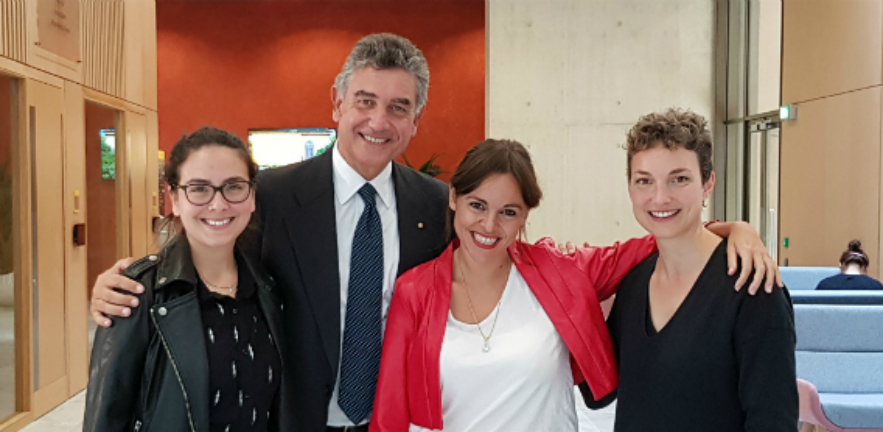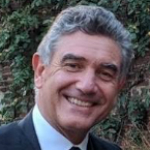The Amongst Critical Friends podcast series is a place for critical reflection. In this edition, we discuss the work of three academics who research organised crime and crime fighting. We ask business management professor Roberto Vona, gender equality expert Dr Lilia Giugni and police researcher Laura Gutierrez how they gain more understanding of organised crime and in which ways this knowledge can help the practice of crime fighting.

For this podcast, we invite change makers in business, civil society, policy and academia to the Cambridge Centre for Social Innovation to talk about their work, their ideas and their motivation to strive towards to a more just and sustainable world. This time, Professor Roberto Vona, Dr Lilia Giugni and PhD Laura Gutierrez discuss with Saar Francken how they research crime, crime fighting and the entire system around it, all notoriously difficult topics to study. Furthermore, the researchers discuss how their gained knowledge can help innovate crime fighting.
[soundcloud id=’555341901′ height=’false’ color=’#ff7700′]Beyond the classic model of crime and crime fighting
The classic model stipulates that organised crime is primarily fought by exercising military policing power. But since organised crime has evolved, new ways of crime fighting are needed, explains Roberto. Nowadays, ‘the mafia 4.0’ uses well-established corporations and complex financial constructions to launder drug money and make legal profits. Consequently, the police need the cooperation of accountants to be able to track these activities. As a professor in business management, Roberto sees a place for universities to teach their students about this advanced type of organised crime that happens within legal business practices. Therefore, he founded the Mafia Organisations and Business Lab at the University of Naples, dedicated to analysing the strategic business evolutions of mafia organisations. As part of the lab, he invites public prosecutors, the police, the Bank of Italy and chartered accountants to lecture students in economics and management on mafia practices they might encounter in their careers.
Another type of crime fighting is done by anti-mafia activists. Lilia studies initiatives of anti-mafia activists in Italy and concludes that these activists are “doing gender differently” in their work. Gender dynamics are crucial to mafia-like groups, which recruit young men by appealing to prevalent gender stereotypes. Lilia argues that anti-mafia activists offer alternatives for the “toxic masculinity” role model of the mafia, establishing initiatives as rugby clubs where both boys and girls can play the sport. Lilia’s work shows that non-state actors have an important role in changing the links between communities and mafia organisations from within by changing gender dynamics and reclaiming symbols and spaces.
To be able to understand organised crime, it is crucial to understand its context. Only by studying all the social aspects of crime are we able to gain the necessary knowledge to come up with context-specific solutions, argues Laura. Her critical approach to studying the police in Bogotá means that she will not use West-European criminological concepts to analyse policing in Colombia undiscerningly. Both crime and crime-fighting practices are shaped by social mechanisms, social relations and interactions that take place in the context of these practices. Therefore, solutions can never be universally applicable. Solutions that work well in the Western context should not be seen as ready-made answers to challenges in the South, concludes Laura.
Where research meets practice
How does this knowledge help crime fighting? To serve a wider purpose, the researchers make a conscious effort to produce knowledge that is usable and accessible. For example, by studying organised crime as part of the curriculum, Italian economics and business students become aware of the infiltration of the mafia in mainstream business. The vigilance to recognise mafia infiltration helps prevention and prosecution. Furthermore, the knowledge of successful crime-fighting strategies by state and non-state actors motivates the continuation of crime-fighting efforts.
By designing an action element in the research, the research can also contribute directly to the work of the crime-fighters studied. Even ideas for partnerships might arise. For example, Roberto works together with the musician Maurizio Capone to organise music projects for prisoners. By teaching prisoners how to make instruments from waste, they hope to start a social enterprise that offers job perspectives after release. More about Capone’s work in this video.
About Professor Roberto Vona
Roberto is Full Professor in Business Management at University of Naples Federico II and a Member of the Italian Academy of Business Administration (AIDEA). With a background in economics and business administration, his work covers many areas of research such as entrepreneurship, sustainable development and tech startups. Roberto founded the Mafia Organisations and Business Lab dedicated to analysing the strategic business evolutions of mafia organisations together with students in economics and management and in close cooperation with public prosecutors, the police, the Bank of Italy and chartered accountants.
About Dr Lilia Guigni
Lilia is a post-doctoral Research Fellow at the Cambridge Centre for Social Innovation and a Teaching Associate at the Cambridge Judge Business School. She holds a PhD in Politics from the University of Cambridge and sits in the board of several charities, social enterprises and feminist networks. Lilia founded the gender & policy thinktank GenPol to advocate for gender equality, enable others to understand gender dynamics and find gender-sensitive solutions to their problems. One of her research interests is the role of gender in mafia and anti-mafia organisations.
About Laura Gutierrez-Gomez
Laura is currently completing a PhD at the Institute of Criminology at Cambridge University. Her doctoral research is a qualitative, exploratory study of the police of Bogotá, Colombia. She has also researched state-corporate crime in the Colombian gold-mining business.
Theories of power have her interest, such as crimes of the powerful, critical criminology, green criminology and feminist perspectives on criminology.
About Saar Francken
Saar works on and studies bottom-up approaches to social issues. Saar’s expertise is connecting multiple stakeholder perspectives in complex social systems to find new solutions. She has ten years of experience delivering social innovation as social entrepreneur and consultant. Her clients include governments, commercial banks, social housing associations and nonprofit organisations. In 2018, she graduated with distinction from the Masters programme at the Cambridge Centre for Social Innovation.






Leave a Reply